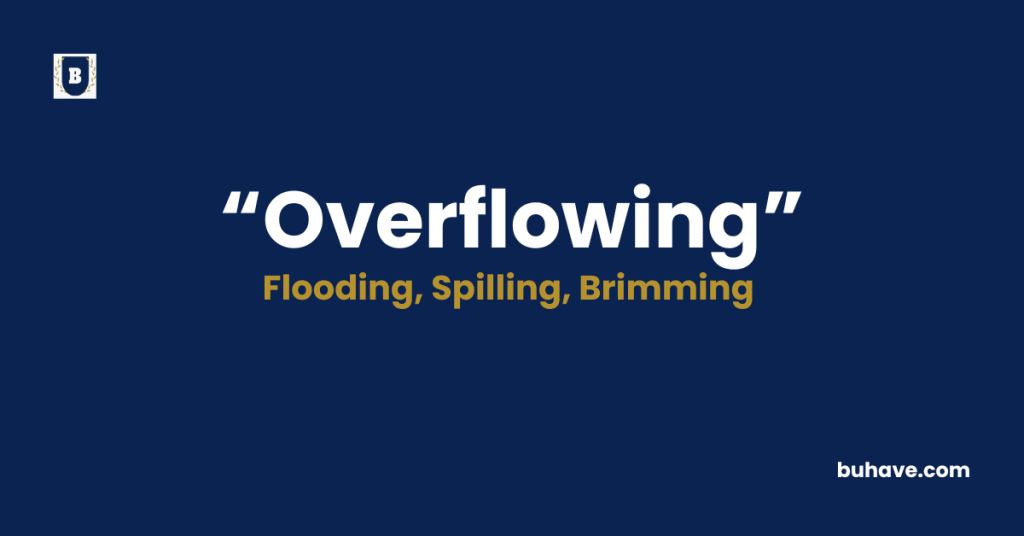The word ‘Overflowing’ (Adjective) describes a state of being so full that it spills out or exceeds limits—often used to express an abundance of emotion, quantity, or energy. In this guide, you’ll learn the full definition, synonyms, antonyms, etymology, and real-life examples of how to use ‘Overflowing’ correctly in sentences.
Overflowing Explained in Depth
A complete and detailed guide to the word Overflowing including meaning, definition, examples, etymology, synonyms, and antonyms.
Meanings of Overflowing
The word overflowing means to be filled beyond capacity, whether in a literal, emotional, or metaphorical sense. It suggests an overwhelming abundance that cannot be contained. When used literally, it describes a physical container like a cup, river, or bathtub that has been filled so much that its contents begin to spill over. Figuratively, it’s often used to describe intense feelings, such as joy, love, pride, or gratitude. For example, someone might say their heart is “overflowing with happiness” after receiving great news, or that a room is “overflowing with energy” during a celebration.
In daily use, “overflowing” implies richness and intensity. It can apply to both positive and negative emotions, though it’s more often used in a positive light. For instance, a community might be described as “overflowing with kindness” or a holiday meal “overflowing with delicious food.” It paints a vivid picture of something being so plentiful that it cannot be held in one place. The word carries a sense of liveliness, abundance, and vivid expression, making it effective in poetic language and everyday conversation alike.
Definition
Overflowing refers to being filled beyond the brim or limit. It describes a condition where something exceeds its normal or expected bounds whether it’s physical space, emotional expression, or quantity. The term often implies a sense of unstoppable abundance, richness, or intensity that pours out freely and fully.
In practical contexts, overflowing may refer to things like a trash bin that can’t contain more waste, a sink spilling water, or crowds exceeding venue capacity during a touching event. This makes it a powerful adjective that conveys not only size or scale but also depth of feeling.
Interestingly, overflowing carries an inherent dual nature: it suggests excess but also speaks to the richness of that excess. While it can hint at overwhelm or lack of control in certain contexts, it’s more commonly a celebration of something too wonderful or strong to be contained. It embodies the idea of surpassing limits
in ways that enrich rather than burden. Whether in literature, daily conversation, or formal speech, using the word “overflowing” evokes a vivid and relatable image of uncontainable abundance.
Etymology
The etymology of the word “overflowing” reveals its evolution from straightforward linguistic roots that clearly reflect its meaning. The word is a compound of “over” and “flow,” both with Old English origins, combined with the present participle “-ing” to indicate continuous action or state.
- “Over” – From Old English ofer, meaning “above,” “across,” or “beyond.” It functions as a prefix to intensify or indicate that something exceeds a normal boundary.
- “Flow” – From Old English flōwan, meaning “to move or run smoothly, as liquid does.” It comes from Proto-Germanic *flōaną and is related to Dutch vloeien and German fließen.
- “-ing” – A common English suffix forming present participles, indicating continuous action or state.
The combination of these parts—”over” + “flow” + “ing”—created “overflowing” to describe the ongoing state of spilling beyond a limit. The term has been used since Middle English times, both in literal and figurative contexts. Initially, it likely described physical water sources like rivers, but quickly expanded into emotional and conceptual use as metaphor became common in poetic and spiritual texts.
Today, the word retains its powerful imagery. etymology underlines the natural evolution of a word from physical experience to expressive language.
Example Sentences
- Her heart was overflowing with joy when she saw her family at the airport.
- The river was overflowing after days of heavy rain.
- The room was overflowing with laughter during the celebration.
- The basket was overflowing with freshly picked apples.
- He was overflowing with gratitude for the kindness shown to him.
Overflowing Synonyms
- Bursting
- Brimming
- Teeming
- Flooded
- Spilling over
- Saturated
- Overfull
- Loaded
- Crammed
- Abundant
Overflowing Antonyms
- Empty
- Drained
- Depleted
- Sparse
- Lacking
- Scarce
- Unfilled
- Insufficient
- Minimal
- Vacant
FAQs about Overflowing
Here are some frequently asked questions (FAQs) about the word “Overflowing”
1. What does “overflowing” mean in daily conversation?
It usually refers to something being so full—of emotion, people, or things—that it can’t be contained or controlled.
2.How is “overflowing” different from “full”?
“Full” means at capacity, while “overflowing” means exceeding that capacity—going beyond full.
3. Is it possible to be overflowing with negative emotions?
Yes. People can be “overflowing with anger,” “frustration,” or “grief” when those feelings are intense and overwhelming.

















